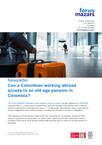Can a Colombian working abroad access to an old age pension in Colombia?
The following are the aspects considered by this Corporation for its decision, as well as other relevant Corporation for its decision, as well as other relevant points that Colombians should consider if they wish to work abroad, without affecting their right to obtain an old age pension in Colombia.
Subordination in Colombia
In the above-mentioned high court decision, the case of a Colombian engineer hired more than 40 years ago by a foreign oil company to perform his duties in Bogotá D.C., Colombia, was analyzed. However, during the relationship, the employee was transferred to several companies belonging to the same corporate group, having to render his services in Brazil, Argentina, Algeria and Mexico. Finally, in 2012 they agreed to terminate the contract by mutual agreement.
In 2015, the plaintiff engineer in such a case, asked the oil company for an old age pension, but the response was negative, so he called the company to court to have the pension recognized and, in subsidy, asked the company to be sentenced to transfer the value of the contributions to Colpensiones.
Although in the first and second instance only the periods worked in Colombia were recognized, considering that the contracts entered abroad were not subject to Colombian labor legislation, the Supreme Court of Justice determined that they could be regulated by national legislation.
To this, this entity recalled that in labor matters, the Colombian-regulation does not apply to services rendered abroad, except in the case that:
- The contract has started in Colombia and the continuity of the subordination from Colombia is unequivocal, or;
- The parties themselves have expressly agreed to submit to Colombian law during this period.
In the present case, it stated that, although it could be inferred from the transfers or assignments that the employee's obligation to render personal services in Colombia ceased, because of the need to work for companies of the corporate group in other countries, the truth was that the employee had to comply with the assignment policies and the terms and conditions of the transfer. To do so, he had to keep the employment contract in the country of origin (Colombia), because it was with the branch with which he was legally bound, which was part of a collective.
Old age pension for Colombians working abroad
As indicated above, if a worker effectively performs his duties abroad, and the subordination is carried out by his employer located outside the national territory, Colombian labor and social security regulations would not apply to him, and therefore, for his old age pension in Colombia, only the time effectively worked in this country would be considered.
However, in addition to the above, Colombians enjoy pension benefits in 14 countries by virtue of the Ibero-American Social Security Agreement, approved by Law 2103 of 2021. This agreement, which applies in Argentina, Bolivia, Brazil, Chile, Colombia, Ecuador, El Salvador, Spain, Paraguay, Peru, Portugal, Dominican Republic, Uruguay, Cuba and Mexico, allows migrant workers who have worked in one or more of the signatory states to benefit from the contributions made in any of these territories to obtain access to economic benefits derived from disability, old age or survival.
Basic principles of the agreement
- Equality of treatment between nationals and foreign persons providing services in a given State.
- The determination of a single applicable legislation, since only one State's social security legislation can be compulsorily applicable at a time.
- Preservation of pension rights expectations, through the totalization of contribution or employment periods and the application of the “pro rata” rule.
- The preservation of acquired rights, through the application of the “exportability of benefits”.
- Administrative collaboration.
What documentation does a Colombian require to work abroad?
For a Colombian to legally work abroad, he/she must comply with certain requirements and have the appropriate documentation, which varies according to the country of destination. The following are some of the most common documents that may be required:
- Valid passport: This document must be valid for the entire time the Colombian national plans to be out of the country.
- Work Visa: Most countries require a work visa. This is a permit issued by the destination country that authorizes the holder to work legally. The type of visa, requirements and application process vary by country.
- Residence permit: Some countries also require a temporary or permanent residence permit, in addition to the work visa, to live and work legally.
- Employment contract: In many cases, an employment contract signed with a company in the destination country will be required.
- Certificates of studies and/or work experience: Depending on the type of work, it will be necessary to present academic degrees, certificates of studies, or letters of recommendation that demonstrate work experience.
- Criminal Record Certificate: Some countries require a criminal record certificate as part of the visa application process.
- Medical insurance: The employee may require international medical insurance to cover the stay abroad, as some countries require proof of medical coverage. In any case, depending on the contract, this insurance is covered by the contracting company.
- Official translation of documents: In certain cases, the Colombian national must submit official translations of documents in the language of the country of destination.
- Other specific permits: Depending on the profession or activity to be performed, it may be necessary to obtain additional permits or licenses (for example, in areas such as medicine, law, engineering, among others).
It is important to research the specific requirements of the destination country and complete all necessary formalities before traveling. It is advisable to consult with the embassy or consulate of the destination country or an immigration lawyer in that country.
For more information on this or other labor and immigration issues, please do not hesitate to contact us.

